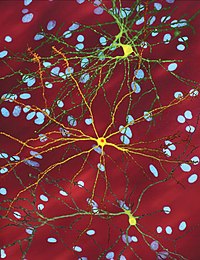
Photo from wikipedia
Oral deutetrabenazine (Austedo™), a reversible inhibitor of vesicular monoamine transporter type 2 (VMAT2) that is structurally related to tetrabenazine is approved for the treatment of chorea symptoms associated with Huntington’s… Click to show full abstract
Oral deutetrabenazine (Austedo™), a reversible inhibitor of vesicular monoamine transporter type 2 (VMAT2) that is structurally related to tetrabenazine is approved for the treatment of chorea symptoms associated with Huntington’s disease (HD). In the pivotal 12-week phase III FIRST-HD trial (n = 90), deutetrabenazine, at doses titrated for optimal chorea control and tolerability (maintenance dosage range 12–48 mg/day), was significantly more effective for controlling chorea in HD patients than placebo. In the ongoing phase III ARC-HD trial, a preliminary analysis demonstrated that deutetrabenazine treatment was associated with improvements in chorea control at 54 weeks in patients who had completed FIRST-HD (i.e. ≤ 66 weeks’ treatment; rollover cohort) or switched overnight from tetrabenazine to deutetrabenazine. The tolerability profile of deutetrabenazine is similar to that of placebo, with most treatment-emergent adverse events of mild or moderate severity. In both trials, with the exception of somnolence, individual neuropsychiatric adverse events typically occurred in < 7% of deutetrabenazine recipients; in FIRST-HD, there was no significant difference in the incidence of individual neuropsychiatric events between the deutetrabenazine and placebo groups. The favourable pharmacokinetic (PK) profile of deutetrabenazine permits a lower dosage than tetrabenazine, thereby potentially improving the safety profile of deutetrabenazine versus tetrabenazine, whilst maintaining its efficacy. Long-term clinical experience will assist in fully defining the safety profile of deutetrabenazine. Current evidence, albeit relatively limited, indicates that deutetrabenazine provides an effective and potentially better tolerated option than tetrabenazine for controlling chorea symptoms associated with HD.
Journal Title: Drugs
Year Published: 2017
Link to full text (if available)
Share on Social Media: Sign Up to like & get
recommendations!